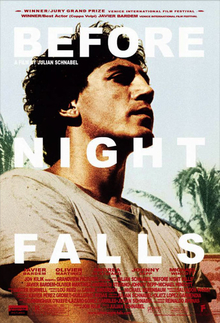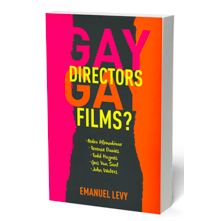Before Night Falls, Julian Schnabel’s bio-picture, may be the first dramatic feature to offer a deep look into the impact of Fidel Castro’s Cuba on homosexual artists and intellectuals; there have been documentaries on this subject.
Grade: B+ (**** out of *****)
| Before Night Falls | |
|---|---|

Theatrical release poster
|
|
A hymn to the value of freedom of expression, the movie captures the horrors of censorship and persecution in a fierce, uncompromising way, while stressing the urge to be creative.
“Before Night Falls” is a logical follow-up to Schnabel’s feature directorial debut, “Basquiat” (1996), which also centers on a troubled artist.
The film world-premiered at the 2000 Venice Film Fest, where it won two major awards, and then played at the Toronto Fest.
As the gay novelist and poet Reinaldo Arenas, who became a prisoner of the Castro regime, Javier Bardem renders a strong dramatic performance that deservedly earned him a Best Actor Oscar nomination.
The screenplay, penned by Schnabel, Cunningham O’Keefe and Lázaro Gómez Carriles, is based on the autobiography of Reinaldo Arenas, which was published posthumously in English in 1993.
After the Cuban revolution of 1959, gay poet and novelist Reinaldo Arenas (Bardem) is arrested, when two boys accuse him falsely of sexual assault. He later gets into bigger trouble for having his books smuggled out of the country and published to great acclaim abroad. Despite harsh conditions, Arenas never stopped his creative work, which includes short stories, poems, and many novels.
For a decade or so, Arenas goes in and out of Cuban prisons. At one point, he escapes from jail and tries to leave Cuba by launching himself from the shore on a tire inner tube. The attempt fails and he is again arrested. While incarcerated, he helps other inmates to write letters to their wives and lovers.
In 1980, as part of the Mariel Boatlift, he is allowed to emigrate because of his sexual orientation. After first suspecting this might be yet another trick of the regime, he claims his homosexuality and moves to Miami.
The second part of the narrative chronicles his life in New York’s Village. Stricken with AIDS, and without health insurance, he kills himself in 1990; a friend speeds up his dying by suffocation with a plastic bag.
A known painter, Schnabel makes a smoother transition as a big screen helmer than other visual artists whose filmic work is often too painterly in the manner of a series of tableaux. As co-writer and director, he shows a good, precise eye for period details and meets the challenge of a making a vivid picture, full of dramatic incidents and emotional moments, which spans over three crucial decades.
The cast includes Olivier Martinez, Andrea Di Stefano, Santiago Magill, Johnny Depp, Sean Penn, and Michael Wincott.
Unfortunately, the movie never found the audience that it deserved, and was a commercial failure, considering its budget.
Cast
Javier Bardem – Reinaldo Arenas
Johnny Depp – Lieutenant Victor/Bon Bon
Olivier Martinez – Lazaro Gomez Carriles
Andrea Di Stefano- Pepe Malas
Sean Penn – Cuco Sanchez
Michael Wincott – Herberto Zorilla Ochoa
Najwa Nimri – Fina Zorilla Correa
Héctor Babenco – Virgilio Pinera
Olatz Lopez Garmendia – Reinaldo’s Mother
Vito Maria Schnabel – Teenage Reinaldo Arenas
Credits:
Fine Line release
Running time: 133 Minutes
Note:
If you want to know more about gay cinema, please read my book:

Gay Directors, Gay Films? By Emanuel Levy (Columbia University Press)
Directed by Julian Schnabel
Produced by Jon Kilik
Screenplay by Lázaro Gómez Carriles, Cunningham O’Keefe, Julian Schnabe, based on Before Night Falls by Reinaldo Arenas and Havana by Jana Boková
Music by Carter Burwell
Cinematography: Xavier Pérez Grobet, Guillermo Rosas
Edited by Michael Berenbaum
Production company: Grandview Pictures
Distributed by Fine Line Features
Release date: September 3, 2000 (VIFF); September 14, 2000 (TIFF); December 22, 2000 (US)
Running time: 133 minutes[1]
Budget $20 million










